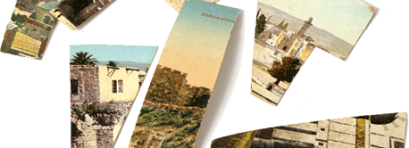Challah covers from the collection belonging to the Old Yishuv Court Museum.
Hand-embroidered challah covers were made by women for their household needs, and sometimes as part of their education and the process of becoming married women. The message conveyed in these embroidered covers is personal and expresses the embroiderer’s feelings. Certain themes would sometimes symbolize ideological leanings or yearning (a wheat stalk) while a whale symbolized hope for the end of days and the arrival of the Redeemer.
Printed challah covers appeared with the advent of new technologies and industrialization. These were made mainly for marketing purposes for charitable institutions and yeshivot that sometimes joined forces for fundraising. The message that they tried to convey through the challah covers is uniform: that the benefactor is part of the quest for redemption; he is contributing to the exalted goal of learning Torah and its return to the Land of Israel – and through his donation, he will be saved.
It would seem that people now invest less in printed and hand-embroidered challah covers.


